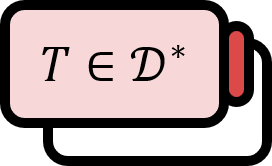Dilation of Distributions
Buildup
The distribution cannot be dilated in the same manner as functions defined in real space because its domain is a function space. However, for regular distributions, there exists a corresponding locally integrable function $u\in L_{\mathrm{loc}}^{1}$, allowing it to be expressed as follows.
$$ T_{u}(\phi) =\int u(x)\phi (x) dx,\quad \phi \in \mathcal{D} $$
Therefore, through some action $S$ on $u$, we can obtain $Su=u^{\prime}$, and if $u^{\prime}$ remains a locally integrable function, then there exists a corresponding distribution $T_{u^{\prime}}$. Thus, we think of the action $S$ on $u$ as if it were an action on $T_{u}$. We aim to extend this idea to all distributions to define the dilation of distributions.
Let’s call the dilation of $c>0$ as $D_{c}$, and the dilation of $u$ as $u^{\prime}(x)=D_{c}u(x)=\frac{1}{\sqrt{c}}u({\textstyle \frac{x}{c}})$. Then, it still holds that $u^{\prime}\in L_{\mathrm{loc}}^{1}$. Hence, there exists a corresponding regular distribution $T_{u^{\prime}}$ and for the test function $\phi \in \mathcal{D}$ it is as follows.
$$ \begin{align*} T_{u^{\prime}}(\phi)&=\int u^{\prime}(x)\phi (x)dx \\ &= \int \frac{1}{\sqrt{c}}u\left( \frac{x}{c} \right)\phi (x)dx \\ &=\int u(x) \sqrt{c}\phi (cx)dx \\ &= \int u(x) D_{1/c}\phi (x) dx \\ &= T_{u}(D_{1/c}\phi) \end{align*} $$
Definition1
The dilation of the distribution $T$ is defined as follows.
$$ (D_{c}T)(\phi):= T_{u}(D_{1/c}\phi) $$
Gerald B. Folland, Fourier Analysis and Its Applications (1992), p311 ↩︎
